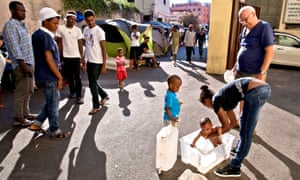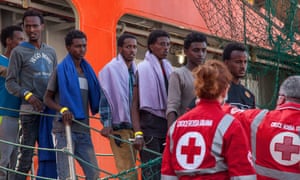PBS: Escaping Eritrea … [Read More...] about ካብ ውሽጢ ቤት ማእሰርታት ኤርትራ
Mark Townsend | Sunday 1 January 2017 | The Guardian
"We don't take sides; we help you see more sides."

Published:
PBS: Escaping Eritrea … [Read More...] about ካብ ውሽጢ ቤት ማእሰርታት ኤርትራ
Mark Townsend | Sunday 1 January 2017 | The Guardian
They had hoped to set sail together, negotiating the notorious Mediterranean crossing as a family. But in late April 2016, as the throng of refugees jostled on to the waiting boat, 13-year-old Dawit somehow went ahead and was separated from his mother and brother. Panicking, he attempted to leap overboard as the vessel pulled away from the Egyptian coast. Witnesses described the young Eritrean as “petrified” and sobbing as he watched his mother and younger brother, who were still on the shore.

Dawit survived the crossing – unlike more than 5,000 refugees who drowned while making it in 2016 – arriving in Sicily before being taken to a reception centre in Rome. From there, he called his mother twice a day. The two were close, a bond amplified following his father’s disappearance shortly after joining the Eritrean military.
But Dawit’s mother and brother never turned up. Their boat belatedly left north Africa on 3 June 2016. Chronically overcrowded, it was rocking alarmingly as it headed for Italy. Eventually it broke apart and sank. Both drowned.
Even by the standards of the multiple tragic narratives of the refugee crisis, Dawit’s ordeal is shocking. But the orphan’s personal anguish is also about to affect the destiny of potentially thousands of child refugees. On 19 December, in a so-far undisclosed but groundbreaking judgment, the high court in Britain ordered that Dawit be brought to the UK immediately and reunited with his aunt in north London.
Delivering another legal defeat for the Home Office over its approach to the refugee crisis, the judgment carries profound implications for thousands of unaccompanied minors in Italy and throughout Europe. It allows the court to intervene when the Dublin regulation, designed to reunite unaccompanied refugee children with their families, is failing to protect the “best interests” of vulnerable minors.
Although attention has been focused on France and the aftermath of the Calais camp being dismantled, huge numbers of unaccompanied child refugees have gathered in Italy. UN figures reveal 19,000 minors arrived there between January and October 2016, an 88% rise on the same period in 2015. A sizeable number are believed to have legal rights to family reunification in the UK, but campaigners say the system is broken. None were transferred from Italy in 2014 and 2015, and only three in 2016.
It is almost certain that Dawit, who turned 14 last month, would have remained alone and traumatised in Rome had he not been identified by volunteers working for Safe Passage, a programme of Citizens UK, the social action charity chiefly responsible for the successful transfer of children from Calais to Britain and whose court triumph last January kickstarted the resettlement of minors in northern France to the UK. The belief is that Dawit’s case will act as a similar catalyst for children in Italy and Europe.
“The courts have given the government legal, but also moral direction in how they should approach this serious and desperate issue,” said Rabbi Janet Darley of Citizens UK, which last year founded Safe Passage.
Darley said the Home Office’s attempt to block Dawit’s case was illustrative. “You do not leave a sick and bereaved child in the road to deter others from trying to cross. Particularly when it is our own government’s failure to make the Dublin regulations work that has blocked the pavements.”

Dawit, whose identity cannot be revealed for legal reasons, is expected to arrive in London imminently, where he will stay with his British aunt, Sesuna. For her, it is the first positive development since travelling to Rome on 7 June and telling Dawit that his mother and brother were dead.
Six months on, the teenager is unable to rationalise his loss. “He has found it extremely difficult to process this news and has appeared dazed and in disbelief,” say court documents chronicling his grief. Psychological assessments confirm Dawit is suffering from post traumatic stress disorder, a condition that deteriorates each day he is kept apart from his aunt. “The ongoing separation from his family is causing this vulnerable child harm and deep suffering. He is frightened and highly distressed,” say the legal documents.
Dawit’s plight has also highlighted the attitude of the Home Office to unaccompanied minors. The Dublin regulations were designed to protect the “best interests of the child”, but the court documents suggest a profoundly different approach. On 26 September, Dawit’s lawyers wrote to the Home Office outlining details of his “compelling case”, along with references to his declining mental state, suggesting the child be brought to London by 18 October. The Home Office did not respond. On 10 October his lawyers’s wrote again, this time requesting a transfer by 31 October. Again there was no reply. Critics say it is no surprise that the court judgment found the Home Office “acted unlawfully” in light of its obligations to the young Eritrean. So far, through the tenacious championing of Safe Passage, 220 children have been given refuge in the UK using the Dublin agreement.
Dawit’s lawyer, Mark Scott of Bhatt Murphy, hopes the court triumph will transform the dynamic with thousands of minors benefiting. “This case sends a very clear message to European governments and the European commission: effective systems must be established so that the rights to family reunification in the European regulations and directives are accessible for children.”
For Dawit, broken by trauma and bewildered by the reluctance of adults to reunite him with the remaining members of his family, the legal victory offers the chance of a new life and an opportunity to heal.